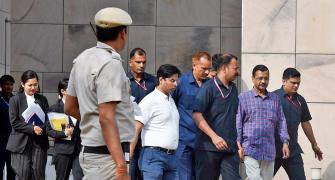External Affairs Minister Pranab Mukherjee, who is also managing the finance ministry, said in Parliament on Monday while presenting the Interim Budget for 2009-10 that "tax rates must fall and our ability to pay taxes must rise."
However, he disappointed big time by not announcing any relief in taxes or change in the tax structure to bring relief to the common man.
So, in effect, the tax structure for the common man remains what it was the last year. Click here to find out.
For a break up of the tax sops given during the last year, click here.
He did not announce any major sops and stuck to highlighting the achievements of the United Progressive Alliance government and just reading out a lackluster statement of accounts and achievements of the government over the last five years.
The stock markets sank as Mukherjee's speech continued, especially concerned over no fiscal measures or duty cuts or tax sops being announced.
Of particular concern to the industry and the markets is the rising fiscal deficit and the fact that the nation will have to wait for a full budget to get any relief.
The following are the details of what Pranab Mukherjee said about the government's tax policy:
Indirect Taxes
During the first half of the fiscal year, the global spurt in commodity prices (crude petroleum, food items and metals) led to increases in domestic prices of essential items and industrial inputs, putting a severe inflationary pressure on the economy. Hence, the Government took several measures after the presentation of the Union Budget 2008-09, particularly on the Customs side, to contain the rising inflation, as detailed below:-
Customs
On 21.3.2008, to curb the inflationary trends in the economy arising out of a rise in prices of food items, a sharp reduction was effected in the import duty rates on various food items such as semi-milled or wholly milled rice (70% to nil) and crude and refined edible oils (from 40%-75% to 20%-27.5%). On 01.04.2008, a further reduction was effected in the import duty rate- on all crude edible oils duty was reduced to nil, and on refined edible oils duty was reduced to 7.5%.
Export duty of Rs 8,000 PMT was imposed on exports of Basmati rice with effect from 10.5.2008.
With effect from 10.5.2008, import duties on crude petroleum was reduced to nil and on petrol and diesel to 2.5% (earlier 7.5%). Customs duty on other petroleum products was reduced from 10% to 5% on 04.06.2008.
Import duties were reduced to nil on many iron and steel items as well as on specified inputs for this sector (zinc, ferro-alloys, metcoke) on 29.4.2008. Further, in order to increase the domestic availability and bring about moderation in prices, export duties were imposed on many items in the iron and steel sector @ 15% ad valorem on pig iron, sponge iron, iron and steel scrap, iron or steel pencil ingots, semi finished products and HR coils/sheets, etc.
On 08.07.2008, raw cotton was also fully exempted from customs duties so as to contain the prices of raw cotton and augment the domestic supply.
Excise
With effect from 04.06.2008, excise duty on unbranded motor spirit (MS) was reduced from Rs 6.35 per litre to Rs 5.35 per litre and on unbranded high speed diesel (HSD), excise duty was reduced from Rs 2.6 per litre to Rs 1.6 per litre.
In the post-October stage, while the inflationary pressures on the economy were subdued, the global meltdown and resultant slowdown of the Indian economy required review of the existing policy in favour of maintaining the growth momentum and retaining export markets. As such, the following policy changes were effected which would be reviewed in the ensuing financial year in the light of the macroeconomic situation particularly the growth of the manufacturing sector:
Excise
With effect from 07.12.2008, a fiscal stimulus package was implemented.
As part of this package, Government implemented an across-the board reduction of 4 percentage
points in the ad valorem rates of excise duty on non-petroleum items, with a few exceptions. Thus the three major ad valorem rates of Central Excise duty viz. 14%, 12% and 8% have been reduced to 10%, 8% and 4%, respectively.
The specific rates of duty applicable to cement and cement clinker were also reduced proportionately.
Customs
Export duties on iron and steel items were withdrawn w.e.f. 31.10.2008.
Aviation turbine fuel was fully exempted from basic customs duty for the benefit of the aviation industry w.e.f. 31.10.2008.
In addition, to provide a level playing field to the domestic industry, some customs duty exemptions provided earlier to combat inflation, on iron and steel items, zinc and ferro-alloys, were withdrawn w.e.f. 18.11.2008.
As an incentive to the infrastructure sector, the CVD and Special CVD exemption granted to imports of cement has been withdrawn w.e.f. 2nd January, 2009 to provide a cushion to domestic cement industry and boost demand.
In the power sector, customs duty on naphtha used for generation of electricity by electrical generating stations has been fully exempted w.e.f. 2nd January, 2009 till the end of this financial year.
Service Tax
The refund of service tax paid by exporters on various taxable services attributable to export of goods has been further extended to include clearing and forwarding agents services.
The upper limit of refund of service tax paid by exporters on foreign commission agent services has been enhanced from 2% of FOB value to 10% of FOB value of export goods.
Drawback benefit can now be availed of simultaneously with refund of service tax paid in respect of exports.
In order to mitigate the genuine hardships of goods transport agencies, eight specified services which are provided to goods transport agency have also been fully exempted from service tax.
Direct Taxes
7. Over the last five years, widespread reforms have been ushered in the area of direct taxes. The reform strategy comprises the following elements: -
Minimizing distortions within the tax structure by expanding the tax base and rationalizing the tax rates.
Enabling the tax administration to provide quality taxpayer services and also enhance deterrence levels. Both these objectives reinforce each other and have promoted voluntary compliance.
Re-engineering business processes in the Income-tax Department through extensive use of information technology, viz., e-filing of returns; issue of refunds through ECS and refund bankers; selection of returns for scrutiny through computers; e-payment of taxes; establishing a Centralized Processing Centre and an effective taxpayer information system. These measures have substantially enhanced the direct tax revenue productivity from 3.81 per cent of GDP in 2003-04 to an estimated 6.35 per cent of GDP in 2008-09. Further, the share of direct taxes in the Central tax revenues is now significantly higher than the share of indirect taxes resulting in a substantial improvement in the equity of the tax system. Therefore, the reform strategy in the medium term is to consolidate the achievements of the past.
Since there is no change in the tax base and rates, the prospects of growth in direct tax collection in the ensuing financial year will remain unchanged vis-a-vis the revised estimate for the financial year 2008-09.






